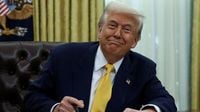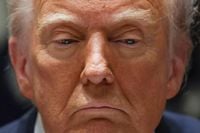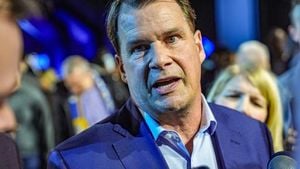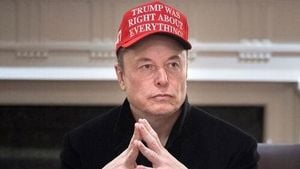On Saturday, March 29, 2025, President Donald Trump made headlines by stating that he does not care if automakers raise prices due to his tariffs, even encouraging them to do so. In a phone interview with NBC News' Kristen Welker, Trump denied having pressured CEOs to control costs following the implementation of his 25% tariffs on imported cars and parts. "No, I never said that," Trump asserted. "I couldn’t care less if they raise prices, because people will start buying American cars." This statement comes in the wake of a report from the Wall Street Journal indicating that Trump had threatened automotive executives with even heavier tariffs if they increased prices as a result of the import taxes.
Trump expressed optimism that his tariffs would lead to higher prices, which he believes will motivate automakers to manufacture cars and parts in the United States and encourage consumers to purchase American-made vehicles. "I hope they raise prices, because if they do, people will buy cars made in the United States. We have plenty of them," he stated during the interview.
His message to automotive CEOs was clear: shift production back to the U.S. While many foreign and domestic automakers assemble a significant portion of their vehicles in the U.S., they also produce cars and parts in Mexico and Canada. "The message is: ‘Congratulations, if you make your car in the United States, you will make a lot of money. If not, you will probably have to come to the United States, because if you make your car in the United States, there is no tariff,’" Trump explained to Welker.
However, automakers have been hesitant to relocate production back to the U.S. due to the substantial costs and time required to build new factories, hire workers, and adjust supply chains. Trump's sporadic tariffs have left industry CEOs uncertain about his long-term plans. On Saturday, Trump reiterated that his upcoming reciprocal tariffs, which will match the import taxes imposed by foreign countries, will be permanent and will take effect on Wednesday, April 3, 2025. "Absolutely, they are permanent, of course," he affirmed. "The world has been robbing the United States for the last 40 years." Yet, he also indicated a willingness to negotiate the tariffs down if other countries are willing to offer something of significant value in return.
Industry experts warned that Trump's tariffs on vehicles and parts will increase production costs for all cars sold in the United States—both imported and domestically manufactured—by thousands of dollars. Regardless of whether automakers decide to raise prices, prices for vehicles are likely to rise due to a supply-demand imbalance. Many automakers are expected to reduce production while they assess whether the tariffs will be a long-term fixture, with concerns that the additional costs may deter potential buyers.
Meanwhile, Canadian Prime Minister Mark Carney, who recently assumed office on March 14, 2025, after Justin Trudeau's resignation, expressed that Canada would retaliate with its own tariffs if Trump proceeds with his planned taxes. This could escalate what is already becoming a damaging trade war.
Since Trump's inauguration in January 2025, world leaders and key trading partners of the United States who oppose his policies have seen improvements in their approval ratings. Opinion polls indicate that leaders from Canada, Mexico, the United Kingdom, France, and Ukraine have gained popularity since late 2024. This shift may be attributed to public backlash against Trump's protectionist policies, uncertainties in global trade resulting from his tariffs, and the impacts of his decisions on international conflicts and security.
In Canada, the election of economist Mark Carney as leader of the Liberal Party and subsequently as Prime Minister has weakened the position of Pierre Poilievre, leader of the Conservative Party. A poll published on March 24, 2025, shows that the Liberal Party has gained an 8-point lead over the Conservatives (46% to 38%), largely due to deteriorating relations with the U.S. Issues that previously made Trudeau unpopular, such as immigration and the housing crisis, have taken a backseat to the need to combat Trump's tariffs on Canadian imports.
In Mexico, President Claudia Sheinbaum, who garnered 75% approval when elected in October 2024, saw her approval rating rise to 85% in a February survey. When asked about her government's handling of the relationship with Trump, 35% rated it as excellent, while 45% viewed it negatively. Nonetheless, 60% of Mexicans rated her approach to deporting illegal immigrants from the U.S. as good or very good, and 55% approved of her handling of the tariffs imposed by the White House. Sheinbaum has also taken a strong stance against Trump regarding immigration, border security, and the renaming of the Gulf of Mexico, promising retaliatory measures against the U.S. due to the 25% tariffs on imports.
In Europe, several leaders have adopted a critical stance towards Trump, especially following his aggressive actions regarding Ukraine in the ongoing conflict with Russia. On February 10, 2025, Trump signed a decree imposing a 25% tax on all steel and aluminum imports from the EU. In response, the European Union announced on March 12, 2025, that it would implement "commercial countermeasures" against the U.S. tariffs, labeling them as "unjustified and harmful" to transatlantic trade. Trump, undeterred, announced on March 13, 2025, that he would impose tariffs of 200% on all wines, whiskey, champagnes, and other beverages from the EU.
This confrontational approach has benefited some European leaders in terms of popularity. A poll conducted by Ipsos Political Pulse from March 14 to 17, 2025, revealed that U.K. Prime Minister Keir Starmer's approval rating rose 8 points since February, reaching 29%. In France, President Emmanuel Macron's approval also increased to 29% in March, according to a BVA poll conducted on March 19-20. Meanwhile, confidence in Ukrainian President Volodymyr Zelensky rose from 57% in February to 67% in March, following his discussions with Trump at the White House on February 28.
As tensions rise and trade policies shift, the global landscape continues to evolve under the influence of Trump's administration, prompting reactions from both allies and adversaries alike.





